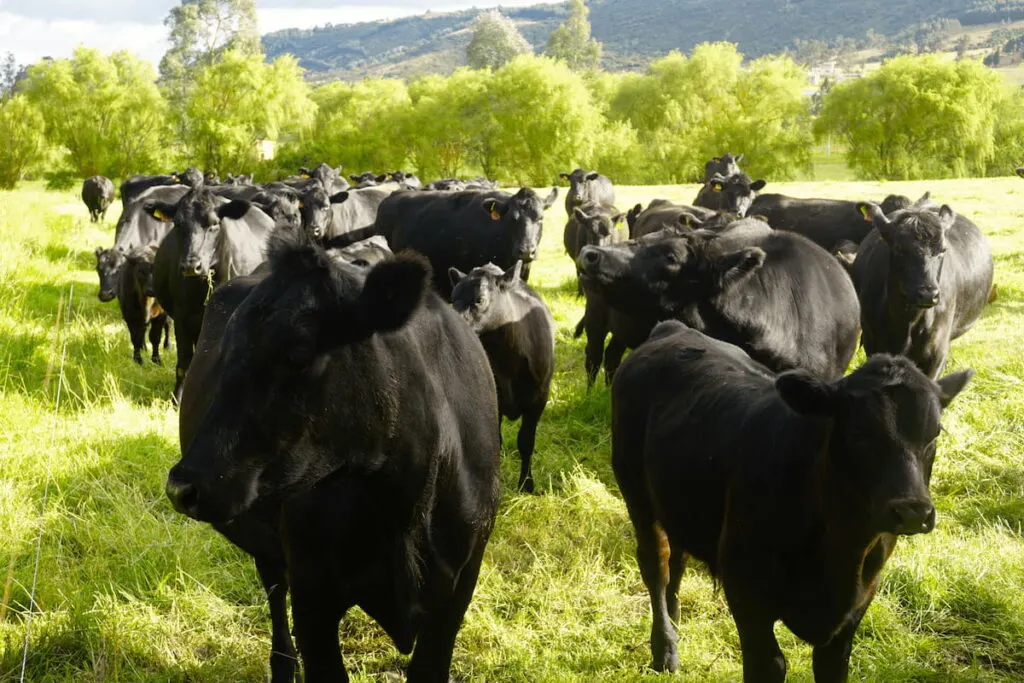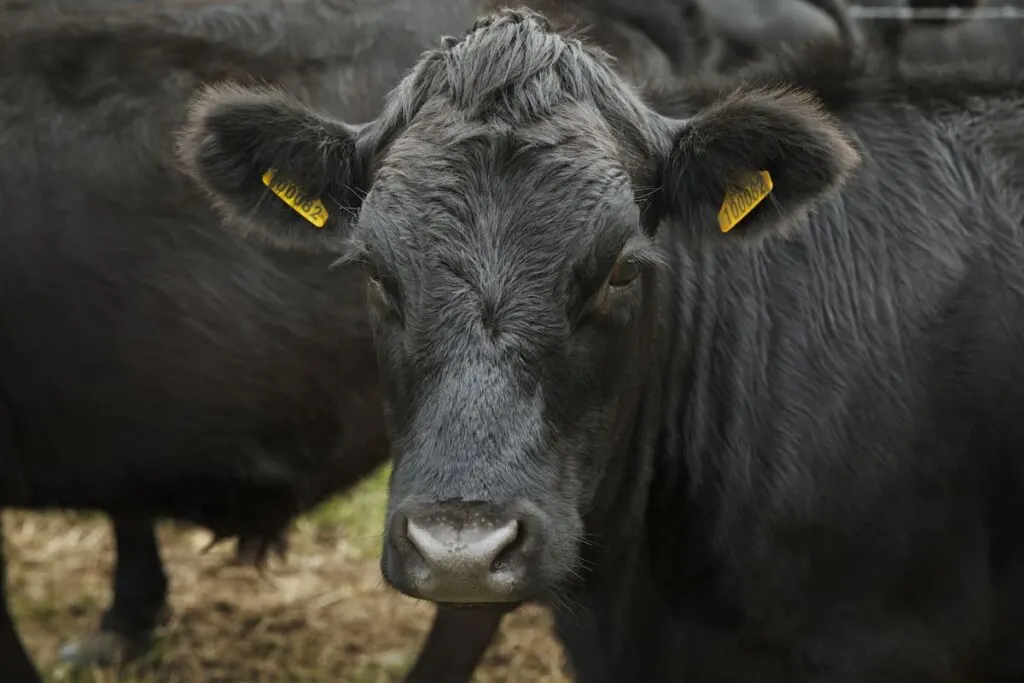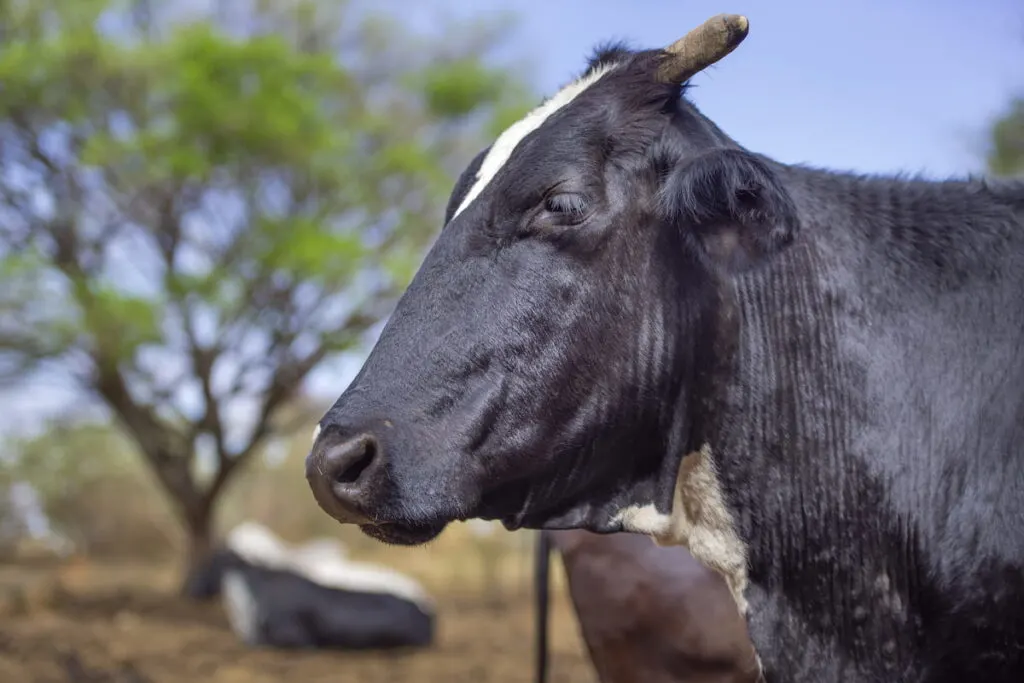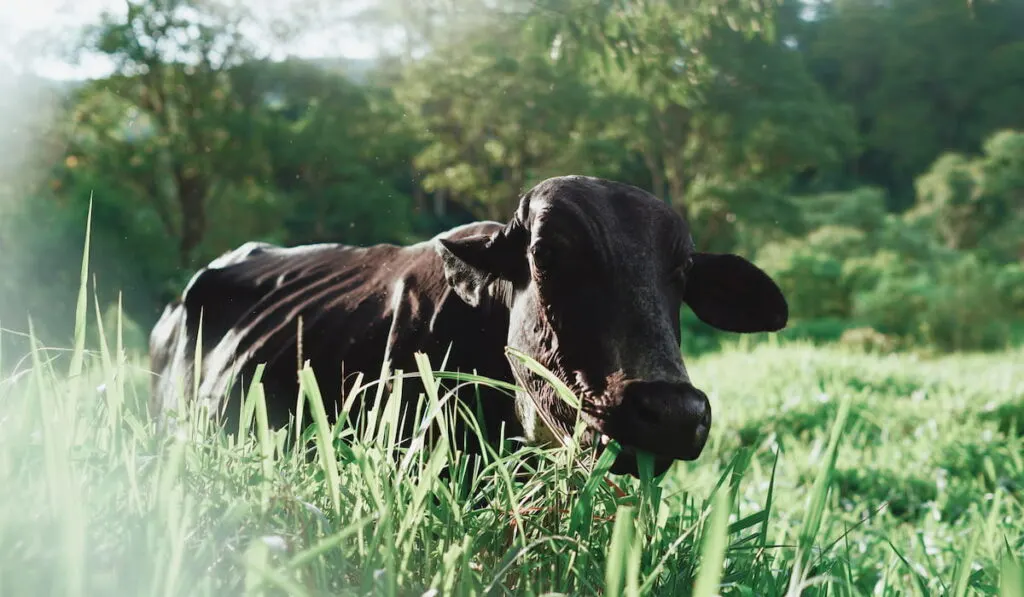If you drive across the country and see cows out to pasture, odds are most of them are black. Black cow breeds are some of the most popular types of cattle in the U.S. and abroad, and there’s something about the way their hides contrast with rich green pastures. It evokes the cowboy spirit.
Most people immediately think of Black Angus cattle when they see black cows. However, other cattle breeds produce entirely black cows and bulls. While the Black Angus is indeed an impressive breed with a strong pedigree, there are other options out there if you’re looking for something black.
We’ve put together this list of seven different black cow breeds and information on each breed to help you know the difference. Whether you’re a hobbyist trying to learn about different cows or are in the market for a black cow breed, this list will help you learn more about these amazing animals.

Table of Contents
Black Angus
If you’ve ever perused the meat section of a grocery store, you’ve seen “Black Angus Beef” across a lot of steak labels and on other cuts of beef. This is one of the world’s most famous and dependable cows. In fact, Black Angus cattle are the most common type of cow in the world when it comes to purebred numbers.
There are a lot of reasons why. The Black Angus cow is easy to raise. They’re fertile and don’t need much help when they calve. Their meat is known for its rich marbling and they command high prices on the cattle market. It’s a wonderful breed of cattle that farmers focus on to this day.
Black Angus meat is so prized that there is even an official certification program for the breed to help consumers know that they’re getting quality when they buy this type of beef.
Simmental
Though Simmental cattle are also found in red and brown, there are a ton of these animals in pure black. The Simmental is originally a Swiss breed of cattle. It was developed a long time ago into the large cows and bulls they are today. It’s one of the oldest breeds and is widely recognized as the second-largest breed in the world.
These cows are famous for their milk production, but they’re also used for meat here in the United States.

Dexter
The Dexter cattle breed was first recognized in southern Ireland, and these cows made their appearance in the United States over 100 years ago. These lovely black cows are one of the smallest cattle breeds. Bulls typically weigh less than 1,000 pounds.
They have long legs and small bodies, but their small stature makes them ideal for farmers or homesteaders with limited pastures. They don’t need large areas to roam. Dexter cows are terrific in hot climates but will do just fine in cold weather as well. They’re low-maintenance animals that are gentle around humans and other animals. You won’t see them making much of a dustup with other cows in your herd.
You might think that these small cows would be too much work, but they are excellent milk producers. Their yield based on their weight is much higher than many other breeds, and it’s full of rich cream with a lot of commercial uses.
Dexter cattle beef is usually darker than that of other breeds and is choice beef.

Welsh Black
Native to the United Kingdom, the Welsh Black cow has a rich history dating back to Roman times. Most of these cows are horned and a rich, dark black color. They produce high-quality meat and are generally decent milk producers.
Modern farmers love having this breed of cattle on their property because they’re big, offer a good return on investment because they grow so quickly, and are durable animals. They do well in different climates and are strong enough to traverse some challenging terrain.
These cattle have gained in popularity outside of the United Kingdom, with plenty of them in Canada, New Zealand, and other countries. You can expect them to live up to 20 years old.
Galloway
Galloway cows are a preferred choice among farmers because they’re excellent mothers. The calving process comes easily, and they do well in taking care of their young. These cows are a bit different from other cattle on this list in that they have longer, wavy coats that offer protection from rain and cold weather.
If you live somewhere with a lot of natural predators, these cows are an excellent choice. They’ve been known to team up and act assertively to protect young cows from predators that come around.
Their beef is regarded as good-quality, with good marbling and a rich beefy flavor. They are also one of the lower-cost breeds when it comes to suckling.

Irish Black
The modern Irish Black cow is bred for excellent meat quality, fast maturity, and efficiency on the farm. If you’re looking for a fertile breed of black cow that gets you the most for your money and is a well-balanced animal, then this breed deserves your attention.
They have a moderate size. You’ll find bigger and smaller cows out there. However, they are extremely fertile and a great way to grow your herd. Just a single bull can have 50-70 cows! The female gestation period is also shorter, at just 277 days.
Their meat is tender and marbled, and they produce a good amount of milk. What’s more, Irish Black cows are easy to herd and handle, so your time spent moving them will be shorter and they take care of themselves when you’re not around.
Australian Lowline
The Australian cattle industry is very advanced, and in many countries outside of the U.S., you’ll see Australian steaks and ground beef in most grocery aisles. One of their most popular cattle breeds is the black Australian Lowline cow. It’s a smaller cattle breed developed through selective breeding to produce excellent meat on smaller pastures.
One of the main benefits of the Lowline breed is that they grow quickly in their first year, a priority for farmers with lots of heads of cattle. While these cows do produce a fair amount of milk, they are most prized for their rich steaks with plenty of fat marbling.
The cow has been so successful that other countries, including the U.S., the U.K., and New Zealand are importers. Now you can find Australian Lowline cows on farms across the world and their steaks in grocery aisles everywhere.
Conclusion
The next time you see a black cow in a field or being rounded up on a farm, don’t just assume that it’s a Black Angus cow.
There are a lot of black cow breeds that come in different sizes, giving farmers more choices than ever.
If you’re looking for a beautiful black cattle breed to add to your herd, there are lots to choose from, and depending on where you live and what you need them for, there is a breed out there that will serve you well.
